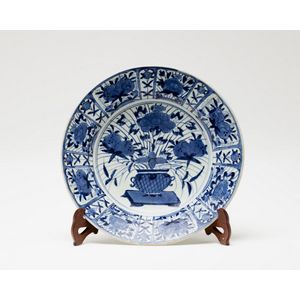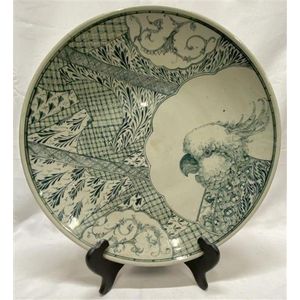Cockatoo Charger by Stephen Bowers
You must be a subscriber, and be logged in to view price and dealer details.
Subscribe Now to view actual auction price for this item
When you subscribe, you have the option of setting the currency in which to display prices to $Au, $US, $NZ or Stg.
- Firing Crack - A firing crack is a crack in a porcelain or stoneware item that occurs whilst the item is in the kiln.They are usually caused by faulty design, where one part is thicker than the surrounding area, and being thicker it cools more slowly, setting up a stress with the surrounding area. Firing cracks are not often seen on modern mass produced porcelain, as the damaged items are discarded during prooduction. However they are seen in earlier items and artisan-produced objects.
- Earthenware - A basic ceramic material that is fired at a low temperature. Earthenware is the basis of almost all ancient, medieval, Middle Eastern and European painted ceramics. After firing, the colour is the colour of the clay when it is dug from the ground: buff, brown and red. It is not waterproof until glazed. Creamware is a type of earthenware covered with a transparent lead glaze. Majolica, faience and delft are also earthenware covered in an opaque white tin glaze.
- Charger - An oversize dish or plate in ceramic, silver, or pewter primarily made for display, but able to be used for serving at the table or on a sideboard.
This item has been included into following indexes:
Visually similar items

A large Japanese Arita blue and white dish, Edo period, decorated in Kraak style, the centre with pomegranate and peony sprays issuing from a vase, the rim with alternating panels of peony, pomegranate, kiku and other flowers, diameter 42 cm

Japanese Arita charger, diameter 30 cm

A Japanese Edo period oval Arita blue and white porcelain charger, with prunus and bamboo painted border around a scene of Daimyo with attendants, c. 1850, length 42 cm (faults)

A large Japanese Arita blue and white dish, Edo period, decorated in Kraak style with pomegranate and finger citron branches to the centre surrounded by panels of peonies and auspicious symbols, diameter 42 cm
